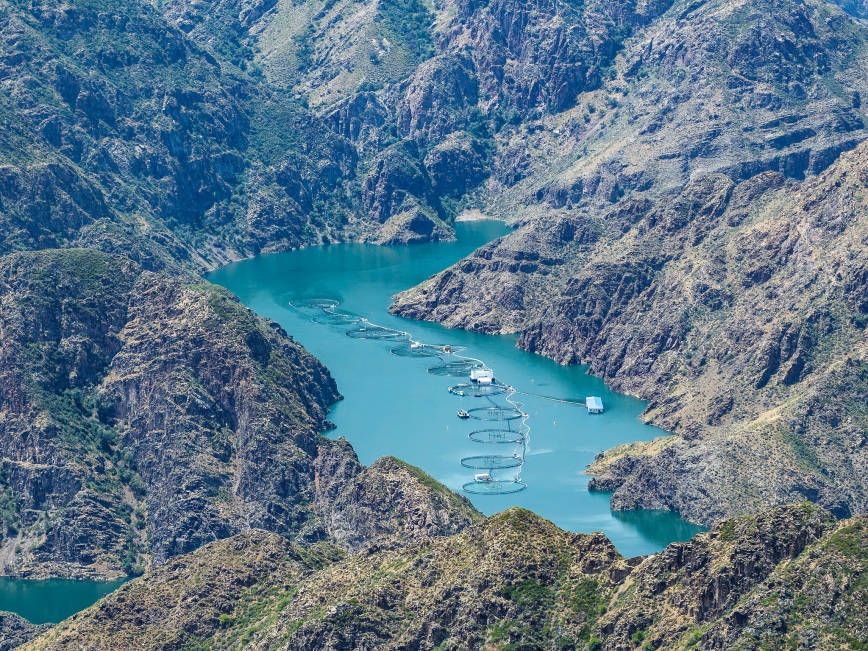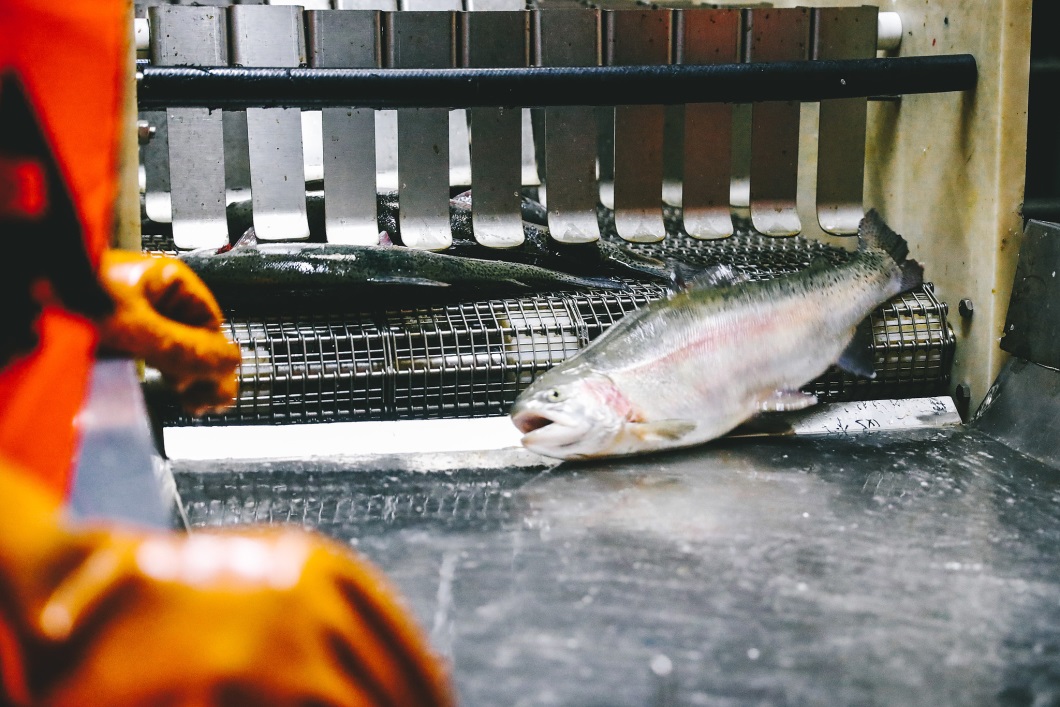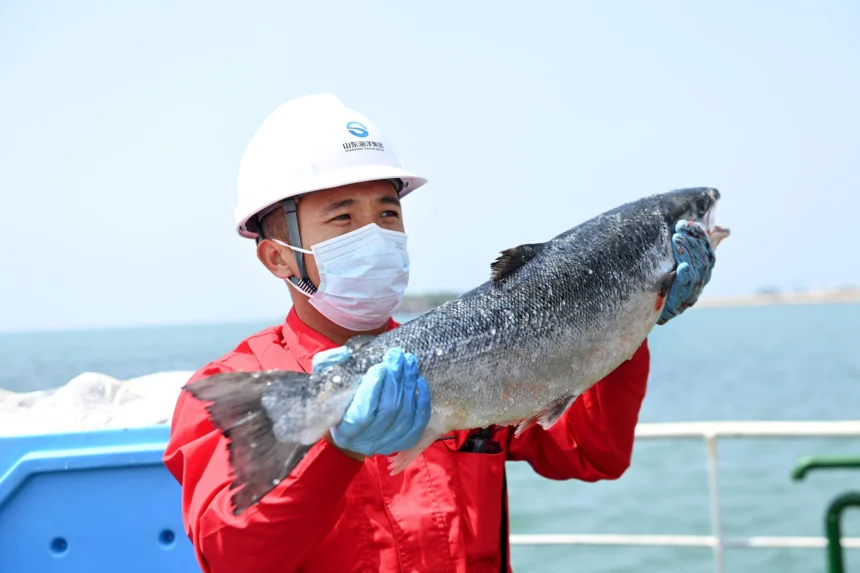XINJIANG – When people think of Xinjiang, they picture vast deserts and scorching summers. After all, it is the region with the largest desert area in China, including the Taklamakan Desert. Dry and sandy landscapes are indeed one side of Xinjiang’s identity.
Yet it’s not the whole story. The region is rich in freshwater and saline resources, with diverse lakes and rivers feeding thriving ecosystems. The Tarim River, China’s longest inland river and the world’s fifth largest, stretches 2,179 kilometres across an immense basin. Bosten Lake, the country’s largest inland freshwater lake, covers 1,646 square kilometres and yields about 5,000 tonnes of freshwater fish annually.
In this land of contrasts, salmon farming has found an unlikely home. In 2024, Xinjiang produced over 8,000 tonnes of salmon, with exports reaching Southeast Asia, Europe, and the Middle East. The question is: how did salmon thrive so far from the ocean?

Ideal Conditions to Nurture Salmon
Counterintuitively, Xinjiang’s natural environment is perfect for salmon farming. Surrounded by mountains, the region collects pure glacial meltwater in its basins, with temperatures between 8 and 18°C throughout the year and high oxygen levels.
These are ideal conditions for cold-water fish to thrive. According to Xinjiang’s Department of Agriculture and Rural Affairs, a Spanish trader once praised Xinjiang salmon for its freshness, clean taste, and well-distributed fat, making it especially well-suited for sashimi.
In Nilka County, northwest Xinjiang, salmon have been raised through cage aquaculture in the Jilintai Reservoir since 2014. After imported fish eggs hatch and the fry grow, the little fish are sorted into different cages by size once they reach around 150 grams. Over time, cage farming has now evolved into a smarter, greener model.
The eco-friendly net cage farming system addresses the pollution issues of traditional cages, maintaining excellent water quality both upstream and downstream. At the farming base, real-time electronic screens track oxygen, temperature, and cleanliness of the water.
Underwater cleaning robots, equipped with sonar imaging and optical zoom cameras, and remove waste with precision. Outside the cages, filter-feeding fish further help consume uneaten feed drifting in the water, creating a natural cleanup procedure.
Feeding has also gone high-tech. A smart delivery system determines how much food the fish need at each growth stage, cutting down on waste and reducing labour costs. In early 2025, the farming base in Nilka released 9.1 million fish fry, with an expected annual output of 8,000 tonnes.
From Reservoir to Dining Tables
After three years, fully grown salmon are harvested. Workers use a fish pump to gently move the salmon through a tube directly onto the assembly line, a method that minimizes injury and preserves quality. The fish are then rapidly cooled to below 5°C before being transported to the processing plant, where they are transformed into a variety of products, including fresh-cut and quick-frozen salmon.
With the support of the government, local farms work with research institutes to expand product lines. Today, Xinjiang salmon not only reach tables across China but are also exported to Southeast Asia, Europe, and the Middle East. At Yining customs in Xinjiang, chilled salmon can now pass inspection in just 30 minutes, ensuring freshness for domestic and overseas markets.
Today, more than 800 professionals are employed at the salmon farming base in Nilka County, with 60 percent being local Xinjiang people. Many of them once relied on traditional farming or herding, which are easily affected by the weather.
Now, frontline workers at the base earn over $840 a month, about $100 higher than the local average wage. Thanks to these opportunities, 609 families have been lifted out of poverty, and nearly 400 individuals have obtained licenses as professional aquaculture workers.
To help staff establish themselves and feel a sense of belonging, the central government invested nearly $7 million in building dormitories last year. Another $2.8 million has been allocated for staff housing in the county, enabling workers to purchase their own homes with subsidies ranging from $20,000 to $40,000.

Salmon Farming Mirrors Xinjiang’s Growth
Salmon farming is part of a bigger vision for fisheries in Xinjiang. Developing aquaculture not only boosts food supply but also improves fragile ecosystems. On saline-alkali lands, authorities are applying a model known as “fish to reduce salinity and alkalinity”, which increases biodiversity while rehabilitating soils.
The results are already visible. At Swan Lake, after fish farming was introduced, the number of bird species rose sharply, attracting more wild birds to settle in the area. This demonstrates how aquaculture is contributing to both economic and environmental sustainability.
Chinese President Xi Jinping has urged thorough, meticulous, and sustained efforts to build a beautiful Xinjiang, where ecosystems thrive and people live and work in contentment, as part of China’s broader modernization.
The salmon industry is a microcosm of this vision by leveraging the region’s natural advantages, cutting-edge green technology, and strong community support. Xinjiang may be home to China’s largest desert, but it is also a land of rivers, lakes, and ingenuity.
By turning unlikely conditions into opportunities, the region has transformed salmon farming from an improbable dream into a sustainable industry, proving that even in the desert, new life can flourish.














